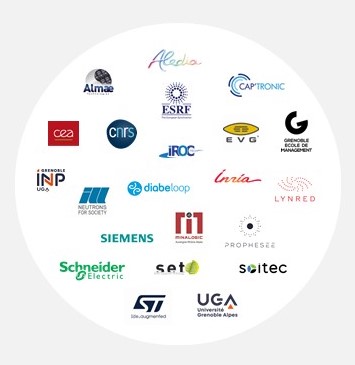The IRT Nanoelec technological research institute recently renewed its consortium agreement and all the specific agreements that bind its 22 partners. The consortium welcomes two new partners: Iroc Technologies and Diabeloop.
The Nanoelec technological research institute is a consortium of private and public sector players. Its mission is to help companies create value and enable their products to stand out on the digital transition stage. Nanoelec contributes to the competitiveness of the electronics sector, primarily in France. It is based in Grenoble, a world-class hub for research, innovation, and production in the field.
New agreement with 22 partners
In 2021, 22 partners from both public and private sectors renewed the contractual framework binding them for the new phase launched in 2021. “This renewed trust from our stakeholders extends an open collaborative framework, which is the very DNA of our institute”, Hughes Metras, Nanoelec General Director, underlined. “The diversity of our consortium, which gathers local academic teams, key industrial players in the ecosystem including large corporations, midcaps, SMEs and startups, enables us to look to the future with confidence and ambition, while continuing with our technological development, training engineering and dissemination missions”, he said.
New partners
Diabeloop joined the consortium on September 2021. The company develops automated insulin delivery solutions enabling people with insulin-dependent diabetes to regulate their glucose levels. Diabeloop was founded in 2015 and has developed the first IA-based closed-loop system that mimics the functions of the pancreas. Within Nanoelec/Pulse program, Diabeloop seeks to strengthen its approach to functional, authentication and privacy issues and is exploring new security strategies.
Iroc Technologies joined the Nanoelec consortium on September 2021. The company is a spin-off from the Tima laboratory (CNRS, Grenoble-INP &UGA) and is developing a range of services for reliability in the microelectronics industry. By taking part in the Nanoelec/Characterization program, Iroc wants to boost R&D and expertise on the effects of irradiation, in particular if electronic components are affected by Single Event Effects (SEE).
New roadmaps
Representatives from the academic and industrial worlds jointly built our R&D programs. Based on major technological challenges, these programs deal with the design and development of new processes, components and systems.
The programs, initially focused on technology roadmaps, are now aimed at addressing key challenges in specific application fields:
- Images & photons: photonic sensors, new-generation displays and smart image sensors based on 3D integration technologies and new architectures
- Digital trust: Cybersafe technologies for connected objects, characterisation and resistance to radiation of components and systems by means of large instruments
Nanoelec also runs training design and technological dissemination programs. With the support of the Auvergne Rhone-Alpes region and Minalogic, Nanoelec teams implement open innovation methods as well as more conventional technological development methods for technology dissemination toward SMEs from all sectors ranging from goods to services, industry, and infrastructures, to consumer products, transportation, environment and health.
Nanoelec is one of the technological research institutes (IRT) and energy transition institutes (ITE) set up by the French Government and financed by the Investments for the Future program (PIA). These institutes pool R&D academic and industrial players whose innovation projects aim to boost the competitiveness of the French economy. IRT Nanoelec is member of FIT, the French Institute of technology association: https://www.french-institutes-technology.fr/





